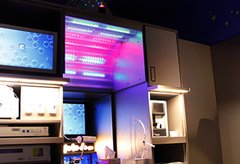2018-12-18
Fighting cystic fibrosis with salt

The Lung Clearance Index (LCI) is determined by Multiple Breath Washout (MBW) in the 'Space Lab'
Cystic fibrosis is a severe disease that could lead to death, if it remains unrecognized or untreated. Scientists of the DZL recently published results of the PRESIS study. They found a less severe course of disease in children who inhaled concentrated saline solution.
Patients with cystic fibrosis (CF) suffer from thick, viscous mucus in organs as lung, intestine and pancreas. This mucus impedes proper digestion of food in the intestine as well as gas exchange in the lungs. The outcome is poor growth of children with CF and a higher prevalence of airway infections and pneumonia. The cause for CF is a genetic defect of the CFTR chloride ion channel which regulates the fluid balance of the mucosae. Because of the fast development of symptoms, life expectancy of patients was very limited during the first half of the 20th century: In general they died already in early infancy. In the meantime, CF patients live at least until their forties. First, the easy to perform sweat test or the recently established newborn screening in Germany improved earlier diagnosis. Second, new medicines, e.g. inhalable antibiotics for a more effective treatment of lung infections lead to a better prognosis.
The PRESIS study which has recently been published in the American Journal of Respiratory and Critical Care Medicine focused on diagnosis as well as therapy: DZL scientists investigated the inhalation of hypertonic saline solution by newborn children, a therapy that is already approved for older children. The saline solution dissolves the viscous mucus in the airways and enables the patients to cough it up more easily. The study should answer the question, if this early and preventive treatment in newborn children delays the onset of symptoms. The course of the therapy was monitored by two diagnostic methods, the measurement of the Lung Clearance Index (LCI) and magnetic resonance imaging (MRI). LCI quantifies the gas exchange in the airways while MRI shows changes in lung structure.
Actually, the study showed that children, treated for twelve months with the concentrated saline solution had a better LCI compared to children who inhaled saline solution with a lower concentration. Moreover, they gained weight faster. This lead to the conclusion that inhalation therapy ameliorates the failure to thrive in CF children. Exacerbations were seen rarely in both treatment groups. Side effects also occurred in the same rate. However, the MRI showed no differences in lung structure – in contrast to LCI. The authors think that is due to LCI being a more sensitive method to monitor this preventive therapy. Further studies have to show, if a long-term therapy with hypertonic saline has further advantages in delaying the course of CF. Prof. Dr. Matthias Kopp, pediatric pneumologist at University Medical Center Schleswig-Holstein in Lübeck is convinced that the results of this study will support an earlier start of an inhalation therapy. “This fits well into the treatment concept for children with cystic fibrosis that suggests an early detection of the disease followed by a therapy start as early as possible.” Kopp estimates that also therapy concepts specific for CFTR mutations could contribute: “We have a drug for the most common genetic mutation (‘F508del’) that improves the function of the CFTR chloride ion channel.” This therapy is approved for children who are six years of age or older.
The PRESIS study (‘Preventive Inhalation of Hypertonic Saline in Infants with Cystic Fibrosis’) is a project of the Clinical Trial Platform of the DZL. Scientists of four out of five DZL sites (ARCN, BREATH, TLRC, UGMLC) collaborated under leadership of pediatricians from Heidelberg. A follow-up trial will test, if two-year old infants also benefit from the medicine that improves the function of the CFTR chloride ion channel and if the treatment is safe. Again, Lung Clearance Index (LCI) and magnetic resonance imaging (MRI) will be used to determine lung function.
Further information:
Stahl M, Wielpütz MO, Ricklefs I, Dopfer C, Barth S, Schlegtendal A, Graeber SY, Sommerburg O, Diekmann G, Hüsing J, Koerner-Rettberg C, Nährlich L, Dittrich A-M, Kopp MV, Mall MA (2018) Preventive Inhalation of Hypertonic Saline in Infants with Cystic Fibrosis (PRESIS): A Randomized, Double-Blind, Controlled Study. Am J Respir Crit Care Med [Electronic publication November 10, 2018] (ARCN, BREATH, TLRC, UGMLC)
/jbul
Calendar
Upcoming events
2024-04-30
Virtual DZL AID Kick-off Seminar
2024-05-29
74th Meeting of ARCN
2024-06-05
